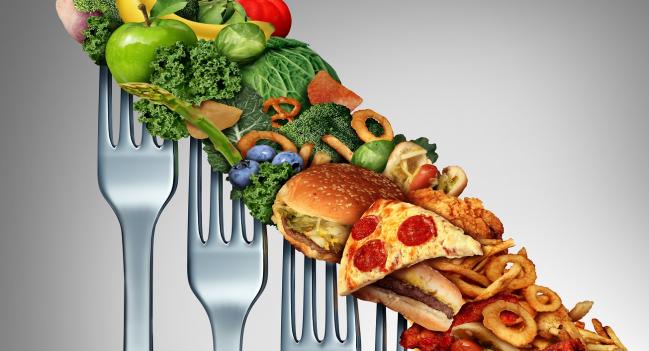Obesity’s Role in COVID-19 Deaths: Big Food, Slow Government to Blame?
A BMJ editorial notes obesity is a modifiable risk factor for COVID-19, calling for reformulation of processed foods and a ban on ads.

An irresponsible international food industry must shoulder a hefty part of the blame for COVID-19’s deadly toll, say the authors of an editorial published yesterday in the BMJ. Moreover, to combat the “parallel” pandemic of obesity, governments need to step in to force reformulation of processed foods and prohibit the promotion of unhealthy eating that is causing so much morbidity and mortality worldwide, they say.
“It's like tobacco,” said Graham A. MacGregor, MB BChir, who co-authored the editorial with Monique Tan, PhD, and Feng J. He, PhD (all Queen Mary University of London, England). “Why should the food industry be able to advertise things that are going to kill you?”

Tan and colleagues review the evidence to date showing obesity to be an independent risk factor for more-severe illness and death following SARS-CoV-2 infection. These include a 428,225-patient cohort study showing that of 340 people requiring hospitalization, 44% were overweight and 34% were obese. There’s also the OpenSAFELY study, which looked at more than 12 million electronic records: among the 5,683 patients who died, 29% were overweight and 33% were obese. Both studies, note Tan et al, showed a dose-response relationship between excess weight and disease severity. In OpenSAFELY, the risk of dying from COVID-19 increased by 27% among obese individuals and was doubled in patients with a body mass index greater than 40.
“I think people have recognized now that based on every study you look at—including the early studies in China which were open studies, then from Europe, then from New York—they all show that obesity increases the severity of COVID-19 and increases mortality,” MacGregor observed.
Why should the food industry be able to advertise things that are going to kill you? Graham MacGregor
The only other major risk factors, he continued, are male sex and older age. “If you're elderly and male and obese, I would be seriously worried and would do anything to try and lose weight and eat more healthily and take more exercise,” MacGregor urged. “Those are sensible things to do and the government should be encouraging people to do that, but of course they're not.”
Speaking with TCTMD, MacGregor stressed that the blame rests with government and industry. “One of the very clear messages that we want to give out, which is absolutely true, is that it's not the fault of the individuals that they are overweight; it's the fault of the food industry, because they promote all this very cheap processed foods that are made delicious by adding huge amounts of salt, sugar, and fat, and they then spend billions of pounds advertising this rubbish at very cheap prices, particularly targeted at socially deprived people and, not surprisingly, they're obese.”
This allegation has particular resonance as protestors around the globe continue to call for an end to racism affecting the day-to-day lives of black, indigenous, and people of color who have also seen some of the highest levels of fatalities from COVID-19. In editorials and blogs, healthcare leaders have called on their colleagues to educate themselves about the problem and do their part to eradicate healthcare disparities.
There are a number of theories as to why obesity is amplifying disease severity. One is the chronic inflammatory state seen in obesity, which could play a role in the body’s altered immune response to SARS-CoV-2, potentially weakening the host defense and increasing the likelihood of the dreaded cytokine storm. A second possibility relates to the fact that angiotensin-converting enzyme 2 (ACE2), which SARS-CoV-2 uses to penetrate the cell membrane, is more common in people with obesity. “Whether this is the result of higher ACE2 expression in the adipocytes of people with obesity or having more adipose tissue in general (and thus a greater number of ACE2-expressing cells) is not yet clear,” the authors state.
A third possibility is the diminished lung function and difficulties with diaphragm contractility in people with “massive abdominal obesity,” creating more airway resistance and a lowered ability to fully expand the lungs. “When patients with obesity need to be admitted to intensive care units, it is challenging to improve their oxygen saturation levels and ventilate them,” Tan et al note.
Yet another option, potentially related to the immune system response, is genetics, MacGregor said, adding that this is an area of active investigation for which answers may come in a matter of months. But he dismissed the idea that an underlying genetic predisposition to obesity might also increase vulnerability to the virus. “Obesity is only very rarely genetic,” he insisted. “It’s an environmental disease, largely brought on by the food industry.” The recent and ballooning numbers of obese people in China, India, and Vietnam as the fast-food and processed-food industries have started to flourish in these regions bear this theory out, he added.
Both MacGregor and He are involved with a range of blood pressure advocacy groups that have targeted high-sodium foods and added salt. Speaking with TCTMD, MacGregor used the successful salt reformulation campaigns in the United Kingdom as an example of what similar strategies targeting high-fat/high-calorie processed foods could accomplish with government support.
Of note, despite MacGregor’s longstanding interest in blood pressure, he’s not convinced that hypertension on its own is an important risk factor for COVID-19, pointing to UK studies in which hypertension as a predictor for disease severity and death disappears after adjusting for age, race, sex, and obesity. “Again, it’s early days and we are very cautious in drawing any conclusions from these [observational] studies because we're going to need much bigger studies, but my view is if blood pressure is a risk, it's a fairly small one compared to obesity,” he commented.
Stop the Tide
MacGregor and colleagues conclude by calling on the food industry to “immediately stop” promoting high-fat, high-salt, high-sugar foods, and for governments to mandate the reformulation of unhealthy food and drink. “Reducing salt, sugar, and saturated fat across the board would improve the diet of the entire population and bring even greater benefits for people who are most socially deprived,” they write. “The toll of morbidity and mortality from COVID-19 has made this more apparent and more urgent than ever.”
Ironically, MacGregor said, “at least in the UK, all the work that was going on to try and do something about obesity with the food industry has been abandoned because of the acute urgency of treating people with COVID-19.”
The result has been a collision of two pandemics, he argued, the acute pandemic of COVID-19 and the “chronic” pandemic of obesity. “And the two interact,” MacGregor continued. “Our feeling is that this is a time when governments need to act to do something not only about COVID-19 to try to stop the next wave of the infection or the current infection, but also to do something about obesity.”
People with underlying obesity and obesity-related chronic diseases are at much higher risk for poor outcome: the virus may not be preventable, but those conditions are. Marion Nestle
Cardiologists have a role to play, he added. “They should already be aware of the fact that unhealthy diet . . . is the biggest cause of death and disability in the world,” he said. “But we need to get many more physicians involved in trying to get their own governments and the food industry to do something about about preventing obesity rather than causing it, and COVID-19 has just brought that home again.”
That message needs to be heard on the other side of the Atlantic as well, agreed Marion Nestle, PhD (New York University, NY), who commented on the editorial for TCTMD. “The coronavirus pandemic has revealed a great deal about inequities and contradictions in food systems in the US as well as in the UK,” she said in an email. “People with underlying obesity and obesity-related chronic diseases are at much higher risk for poor outcome: the virus may not be preventable, but those conditions are.”
What the pandemic has made clear, she added, is that preventing obesity “is a societal responsibility, more than a personal one. It reveals the need to create food systems and food environments that support healthy eating and that make healthier foods more available, accessible, and affordable.”
Regulation of the food industry, she added “would help a lot with this.
Shelley Wood was the Editor-in-Chief of TCTMD and the Editorial Director at the Cardiovascular Research Foundation (CRF) from October 2015…
Read Full BioSources
Tan M, He FJ, MacGregor GA. Obesity and COVID-19: the role of the food industry. BMJ. 2020;369:m2237.
Disclosures
- MacGregor reports being the chair of Blood Pressure UK, the Consensus Action on Salt and Health, and the World Action on Salt and Health.
- Her reports being a member of the Consensus Action on Salt and Health and its international branch, World Action on Salt and Health.
- Nestle reports having no conflicts of interest.


Anne Bland
Christine Yarbrough